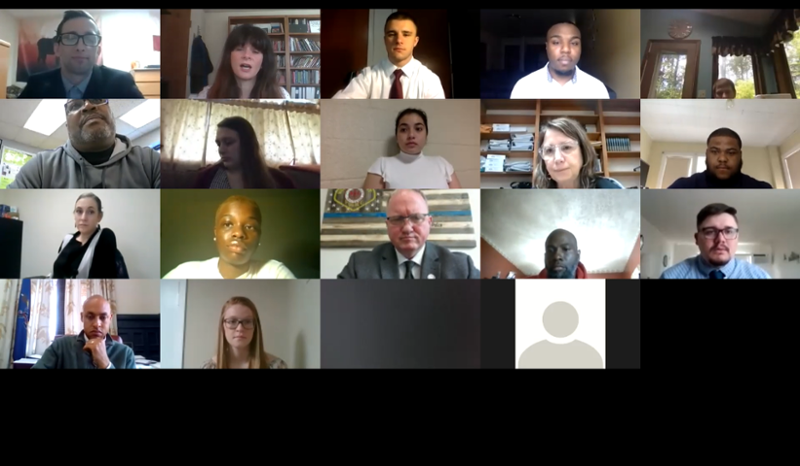
Download Image: Web
Youth crime in Williamsport is not on the rise, according to Lycoming College criminal justice students from the spring semester’s “Crime Prevention and Policy” course. Recent instances of gun violence in the city, however, inspired students to look closely at current trends of criminal activity and offer solutions to the issues that led to these instances of youth crime.
The class, led by Kerry Richmond, Ph.D., associate professor of criminal justice and department chair, met with various stakeholders in the community, including the mayor, police officers, judges and juvenile probation officers, and representatives from schools, alternative education programs and other agencies and community programs involved with youth. Their discussions were followed by extensive research on the issues addressed.
Former chief of police Damon Hagan, current chief Justin Snyder, and assistant chief Jason Bolt were influential in the project, as was Ed Robbins, lecturer in Lycoming’s criminal justice department and former chief of juvenile probation in the county, and Judge Joy McCoy, among others. This research, along with student recommendations, was compiled into a final report and presented to several members of the Lycoming campus and the greater Williamsport community.
The discoveries made by the class and presented to the community touch on several factors at the individual and community levels that influence youth crime today. Their report discussed topics such as dysfunction within the family structure, exacerbated by poverty and trauma, lack of awareness and support for mental health and limited resources and programs for youth, particularly in regards to mentoring. The report also highlighted mistrust between the community and the police and concern over gangs and gun violence.
Students then recommended possible solutions community leaders can use to address these negative influences. The recommendations put forth emphasized increasing support for youth, particularly in regards to mental health, through better screening and programming in the schools. In addition, it was suggested that more opportunities for mentoring with positive adult role models, specifically men of color, are developed. The report also provided recommendations for how to improve community and police relations by enhancing communication between the police and residents and revitalizing community policing strategies.
“By taking a broad look at youth crime in the city, the students in the class gained a deeper understanding of the issue and saw how the research they learn about in the classroom can be implemented in a community, along with the challenges faced in doing so,” said Richmond. “It was our hope that this project will contribute to discussions on how to reduce violence and improve the lives of youth in the city.”
Completing this research during the Covid-19 pandemic posed many challenges, and students were commended for the beneficial potential this research provided to the city of Williamsport. They hope that their work can be utilized in shaping community development programs in the future.
Senior Criminal Justice students who contributed to the project include Shane Casey, Najee Corbin, Alissa Matthews, Madison Losell, Sydney Purcell, Preston Gehring, Jacob Davis, Jalen Williams, Kearly Parra Ortiz, and Steve Longazel.